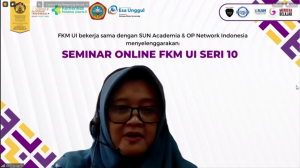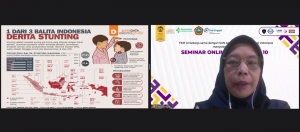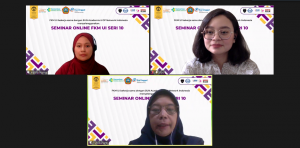
The Faculty of Public Health (FPH) Universitas Indonesia (UI) held SEMOL FPH UI Series 10 on Friday, 17 May 2024. In collaboration with SUN Academia & OP Network Indonesia, SEMOL FPH UI presented two expert speakers in the field of Nutrition with a discussion on Promotion Health and Chronic Energy Deficiency in Pregnant Women.
“Health promotion is very important, especially what cadres do for pregnant women. This is in accordance with one of the government programs, namely Providing Supplementary Food (PMT) sourced from local food to toddlers and pregnant women. “1000 HPK, which was discussed further by the resource person, is a very good entry point if we want to accelerate the reduction of malnutrition and stunting in our country,” said Dr. Ir. Asih Setiarini, M.Sc., Deputy Dean for Education, Research and Student Affairs FPH UI and Coordinator of SUN Academia and Professional Organizations (OP) in his speech.

“Health Promotion through Educational Media: Increasing Cadre Knowledge about IYCF” was the topic presented by Ns. Tuti Asrianti Utami, S.E., M.Kep., Lecturer at STIK Sint Carolus. Health promotion is an effort to empower the community so that they can maintain, improve and protect health through increasing knowledge and abilities in supporting a Healthy Indonesia. Health training for community cadres includes community-based stunting prevention program interventions in the regions.
“Various types of training are provided, ranging from nutritional monitoring, environmental health, healthy community movements, to gender mainstreaming. “The training of community cadres was carried out as an effort to increase knowledge about IYCF (Infant and Child Feeding), namely knowledge of feeding patterns, health services and the family environment,” said Ns. Tuti. “The achievement or hope of public health promotion is the creation of a change in behavior, namely when cadres and their units are able to have changes in increasing their knowledge,” he explained.

“The Effectiveness of Cadre Assistance with Telecounseling for Breastfeeding Mothers and IYCF on the Island of Java” is research conducted by Ns. Tuti with the team. This research carried out and assessed counseling activities carried out remotely using online methods with devices. “The results of this study found a very effective relationship between the effectiveness of telecounseling on breastfeeding success and IYCF. “The telecounseling guide provided has provided benefits to breastfeeding mothers and/or toddler mothers with the results felt by the informants to be good and they did not think that gadgets could help them,” said Ns. Tuti explained the results of the research data conducted.
The second topic entitled “Chronic Energy Deficiency (KEK) in Pregnant Women” was delivered by Harna, S.Gz., M.Si., Lecturer in the Nutrition Study Program at Esa Unggul University. KEK is a problem caused by unbalanced nutritional intake, causing a lack of energy for a long time. “The magnitude of the SEZ problem in Indonesia has indeed decreased. However, the decline was only 0.4% over 5 years. “This means that the KEK issue is still a concern that must be addressed,” said Harna.

“Prevalence and Determinant Factors of Chronic Energy Deficiency (CED) in Pregnant Women” is a study conducted by Harna, S.Gz., M.Sc., with the team at the Parung Panjang Community Health Center. This research proves that energy and protein have a significant relationship with the incidence of CED, and the prevalence of age, parity, interval distance, infection, and level of knowledge are determining factors for the occurrence of CED in pregnant women.
“Apart from having an impact on the child or the fetus they are carrying, KEK will have an impact on pregnant women by causing anemia, preeclampsia, low birth weight (LBW), stunting and birth complications,” said Harna. “So, prevention of CED in pregnant women should start early, to be precise from the teenage girl stage. “Apart from that, prevention can be carried out during CATIN (bride-to-be) counseling and integrated examination of pregnant women through Integrated Antenatal Services, as well as support from various parties, ranging from cross-sectors, professional organizations, community leaders, NGOs, to other institutions,” he explained. (ITM)
